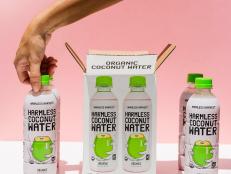Coconut Water: Is It Worth the Hype?
Not to be confused with the white coconut milk that comes from pulverized coconut flesh, coconut water is the clear fluid that comes from young coconuts. This coconut “juice” contains a combination of water, carbohydrates and electrolytes, which is why some folks are turning to it as a replacement for Gatorade, Powerade and other sports drinks.
Sports drinks are designed to replace the water, calories and minerals (electrolytes) lost from activity and sweating. Carbs provide us energy and electrolytes -- for example, sodium and potassium -- are vital to proper muscle function, including that all-important muscle, the heart. The body likes to keep its electrolyte levels balanced, so it’s important to take them in, but you don’t want to overdo it.
As far as flavor goes, coconut water only has some subtle coconut action going on. Some describe the taste as slightly sweet, sour or tangy. Some brands also have an unpleasant aftertaste. Coconut water sure is expensive, too! We shopped around and found 12-packs going for around $20.00 -- that’s about $0.15 per ounce. Sports drinks usually go for about $0.05 per ounce (a third the price!).
Coconut milk is high in fat where as the water contains virtually none. When compared to sports drinks, both coconut water and your average Gatorade have about 45 calories and 12 grams of carbohydrates per cup.
The biggest differences are the electrolytes. In a one-cup serving of an average sports drink, you’ll get 95 milligrams of sodium and 40 milligrams of potassium. An equal portion of coconut water has anywhere from 40 to 250 milligrams of sodium and 600 to 700 milligrams of potassium. The higher levels of electrolytes in coconut water doesn’t make it dangerous (a cup of orange juice has about 475 milligrams of potassium), but mega-doses of potassium can be dangerous over time, especially if you have kidney issues.
Just so you know -- sports drinks have been optimally formulated for athletes, not couch potatoes. They are sweetened with sugar, but it serves the very important purpose of providing calories and carbohydrates for quick energy. The average person who doesn't get much exercise doesn't need them.
Bottom Line: Coconut water isn't harmful, but it may not be worth the extra hit to your wallet. As a sports dietitian who works with athletes and active individuals of all ages, I recommend (when necessary) to stick to sports drinks, water and a balanced diet.


































